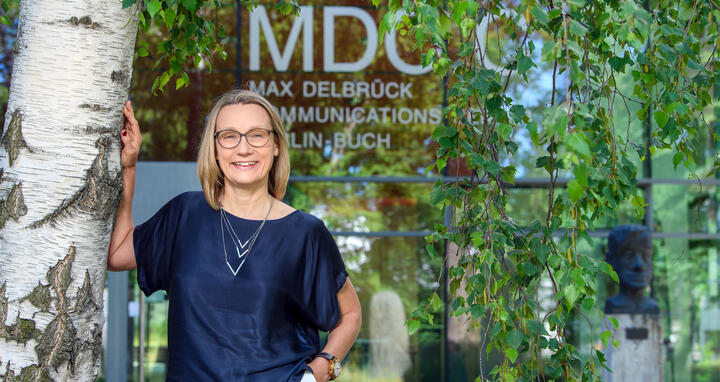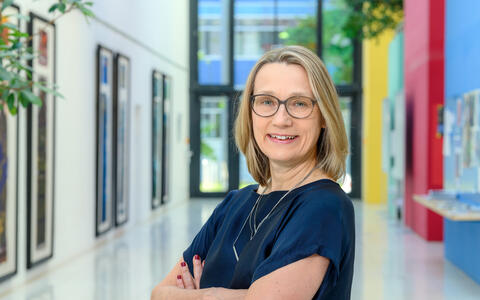Maike Sander named to lead the Max Delbrück Center
As Scientific Director, my goal will be to further strengthen the MDC’s role as a leading biomedical research center.
On November 1, 2022, Prof. Maike Sander will take the reins as Scientific Director and Chair of the Board of the Max Delbrück Center for Molecular Medicine in the Helmholtz Association (MDC). The Supervisory Board of the MDC formally appointed her to the post on Thursday, June 16, 2022. The MDC, which is celebrating its 30th anniversary this year, is one of six Health Centers in the Helmholtz Association of German Research Centers. The internationally renowned researcher and experienced science manager Maike Sander will be succeeding Prof. Thomas Sommer, who has directed the MDC on an interim basis since 2019. That will make Sander the first woman to head one of the Helmholtz Health Centers.
“The MDC has distinguished itself as an internationally renowned center for highly innovative biomedical research,” says Maike Sander. “Work at the MDC lays the foundation for better medicine of the future. The MDC provides on outstanding environment for research and attracts talent from around the globe. I had the opportunity to experience this first-hand as a visiting professor at the MDC. As Scientific Director, my goal will be to further strengthen the MDC’s role as a leading biomedical research center and to deepen partnerships with other institutions in Berlin and beyond, so that our discoveries can be rapidly turned into medical innovations.” Sander emphasizes that “medical innovation needs strong basic science, clinical science and industry partners – components that are all part of the vibrant Berlin biomedical ecosystem,” she points out. “The Berlin region is developing into a flourishing biotech pharma hub and I see the MDC as a principal driver of innovation in this landscape. I very much look forward to working with all stakeholders across Berlin.”
Novel therapeutic approaches for diabetes
Maike Sander’s research focuses on identifying novel therapeutic approaches for diabetes. To this end, Sander studies the molecular mechanisms that underlie the formation and function of the different cell types in the pancreas, in particular the insulin-producing beta cells. Her goal is to identify strategies for replacing beta cells in diabetes using beta cells derived from human pluripotent stem cells.
Since 2012, Sander has served as the Director of the Pediatric Diabetes Research Center at the University of California, San Diego (UC San Diego), where she is also a Professor in the Departments of Pediatrics and Cellular & Molecular Medicine. In Berlin, Maike Sander will be appointed as Professor at the Charité – Universitätsmedizin.
Prof. Dr. Maike Sander, Scientific Director of the Max Delbrück Center
German Research Minister: An outstanding scientist with international experience
Prof. Sander is the perfect match for the MDC with its mission to improve human health through transformative biomedical research.
“Maike Sander is an outstanding scientist with a track record of innovation in biomedical research,” says Bettina Stark-Watzinger, Germany’s Federal Minister of Education and Research. “I am delighted we have been able to bring her back to Germany after many years in the United States and to win her as the new Scientific Director of the Max Delbrück Center. It demonstrates the attractiveness of Berlin as a hub for biomedical research. As a scientist and administrator, Prof. Sander is the perfect match for the MDC with its mission to improve human health through transformative biomedical research. Also, having a female leader is an important signal. Prof. Sander’s appointment represents a significant gain for German research.”
Prof. Sander’s expertise and experience provide the ideal background for future development of the MDC and for increasing the international visibility of the vibrant life sciences community at the MDC and in Berlin.
Berlin’s Senator for Higher Education and Research, Health, Long-Term Care and Gender Equality, Ulrike Gote, says: “In Prof. Maike Sander, the Max Delbrück Center has gained an internationally renowned scientist as its new Scientific Director. I warmly welcome her to the science and healthcare metropolis Berlin. Prof. Sander’s expertise and experience provide the ideal background for future development of the MDC and for increasing the international visibility of the vibrant life sciences community at the MDC and in Berlin. As the senator in charge of higher education, research, and gender equality, I am delighted to see a woman at the helm of a Helmholtz Health Center.”
Wiestler: The Helmholtz Association stands to benefit tremendously
With Prof. Sander we are gaining an excellent scientist whose expertise will be of tremendous benefit to the Helmholtz Association.
“I got to know Maike Sander as an expert in diabetes and stem cells when she was a visiting professor at the MDC,” says Otmar D. Wiestler, President of the Helmholtz Association. “With her high scientific standing and international experience, she is the ideal person to determine the future direction of the MDC as Scientific Director and Chair of the Board. With Prof. Sander we are gaining an excellent scientist whose expertise will be of tremendous benefit to the Helmholtz Association. A critical focus area is the development of precision medicine approaches. The MDC is at the forefront of advancing research in this important area. I look forward to working with Prof. Sander and to a vivid exchange of ideas.”
About Maike Sander
Maike Sander, a native of Göttingen, is 54 years old. After graduating with a medical degree from the University of Heidelberg Medical School in 1994, she conducted research at the University of California, San Francisco. Before moving to UC San Diego in 2008, she held faculty positions at Hamburg Medical School and the University of California, Irvine. An expert on insulin-producing pancreatic beta cells, she has nearly 30 years of experience in medicine and diabetes research.
Sander is an elected member of the German National Academy of Sciences Leopoldina, the Association of American Physicians, and the American Society of Clinical Investigation. In addition, she is a member of two NIH consortia: The Human Islet Research Network and the NIH Impact of Genomic Variation on Function Consortium, which seeks to define basic mechanisms of gene regulation.
She is a recipient of the Grodsky Award of the Juvenile Diabetes Research Foundation, the 2022 Albert Renold Prize of the European Association for the Study of Diabetes, and the Alexander von Humboldt Foundation Research Award. Since 2019, Sander has been an Einstein Visiting Fellow at the Berlin Institute of Health at Charité (BIH).
Further information
- 30 years MDC
- Sander Laboratory and Publications at University of California, San Diego
Download
Prof. Dr. Maike Sander.
Photo: Peter Himsel, MDC
Contacts
German Federal Ministry of Education and Research (BMBF)
Division for Press; Social Media; Internet
Kapelle-Ufer 1
10117 Berlin
Phone: +49(0)30/1857-5050
presse@bmbf.bund.de
Jutta Kramm
Head of the Staff Unit Communications
Max Delbrück Center for Molecular Medicine in the Helmholtz Association (MDC)
Phone: +49 30 9406-2140
jutta.kramm@mdc-berlin.de or presse@mdc-berlin.de
- Max Delbrück Center for Molecular Medicine (MDC)
-
-
The Max Delbrück Center for Molecular Medicine in the Helmholtz Association (MDC) is one of the world’s leading biomedical research institutions. Max Delbrück, a Berlin native, was a Nobel laureate and one of the founders of molecular biology. At the MDC’s locations in Berlin-Buch and Mitte, researchers from some 60 countries analyze the human system – investigating the biological foundations of life from its most elementary building blocks to systems-wide mechanisms. By understanding what regulates or disrupts the dynamic equilibrium in a cell, an organ, or the entire body, we can prevent diseases, diagnose them earlier, and stop their progression with tailored therapies. Patients should benefit as soon as possible from basic research discoveries. The MDC therefore supports spin-off creation and participates in collaborative networks. It works in close partnership with Charité – Universitätsmedizin Berlin in the jointly run Experimental and Clinical Research Center (ECRC), the Berlin Institute of Health (BIH) at Charité, and the German Center for Cardiovascular Research (DZHK). Founded in 1992, the MDC today employs 1,600 people and is funded 90 percent by the German federal government and 10 percent by the State of Berlin.






